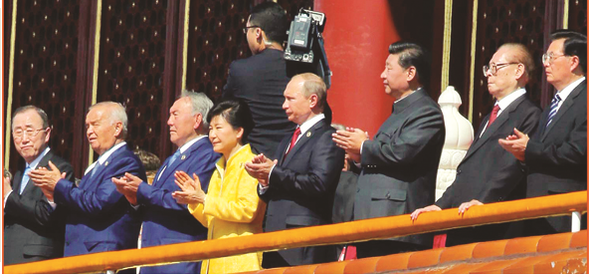Posted on : Sep.5,2015 15:17 KSTModified on : Sep.5,2015 15:17 KST
 |
At the military parade in Beijing marking the seventieth anniversary of China’s war victory over Japan, from right to left, former Chinese Presidents Hu Jintao and Jiang Zemin, current President Xi Jinping, Russian President Vladimir Putin, South Korean President Park Geun-hye, Kazakhstan President Nursultan Nazarbayev, Uzbek President Islam Karimov, UN Secretary General Ban Ki-moon, Sep. 3. (by Lee Jeong-yong, staff photographer) |
Washington officially saying that it’s South Korea’s sovereign right to decide which countries to develop relations with
In contrast with the US State Department’s official response, there is considerable displeasure in Washington about South Korean President Park Geun-hye’s attendance at China’s ceremony marking the 70th anniversary of the victory over Japan in World War II.
During the daily press briefing on Sep. 3, US State Department Deputy Spokesperson Mark C. Toner reconfirmed the US official position that deciding what relations to have with other countries in the region is “a sovereign decision for the Republic of South Korea to make.” The State Department has maintained the position of “respecting” Park’s attendance at China’s military review.
But an expert at a think tank in Washington who spoke on condition of anonymity said, “The overall attitude in Washington about President Park’s attendance at the military review is quite negative. Some are even saying that a country that should be on the Blue Team is on the Red Team,” this expert said.
Blue Team and Red Team, referring to “our” team and the opposing team, are sometimes used at the Pentagon to indicate allied countries and enemy countries. That shows how seriously the US is taking Park’s attendance at the military review.
There are also concerns that Park’s attendance will aggravate doubts in the American government that South Korea is moving closer to China, doubts that Japan is trying to provoke. This is leading to speculation that Park’s attendance will also have some kind of effect on her visit to the US next month.
While stating that the US doesn’t “question or challenge Beijing’s right or authority to host these kind of commemorative events,” Toner added that “we’ve consistently shared with our Chinese counterparts our desire to see these types of events highlight the themes of reconciliation and healing,” indirectly hinting at dissatisfaction about how the event seemed focused on Japan-bashing.
Pentagon Press Secretary Peter Cook also made a snide remark about China’s show of force, saying that military parades are “not our style.“The US military is the world's foremost military [. . .] and I think it's safe to say that we don't need to display it at parades,” Cook said.
Experts’ opinions on the military parade were mixed. Bonnie Glaser, senior adviser for the Center for Strategic and International Studies (CSIS), thought the review was for “internal use,” considering it a “message intended for the Chinese public.”
Scott Snyder, senior fellow at the Council on Foreign Relations, had a more critical take on the military parade, saying that it had an “anachronistic feeling that was reminiscent of the Cold War period.”
By Yi Yong-in, Washington correspondent




